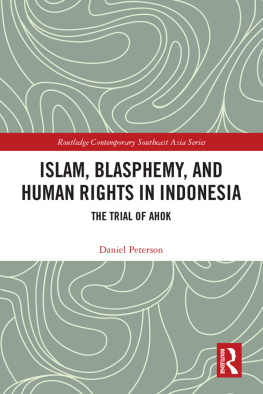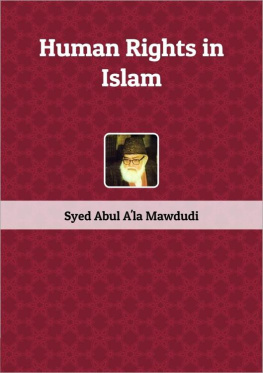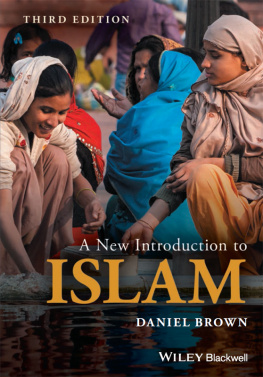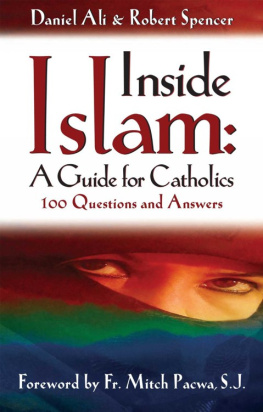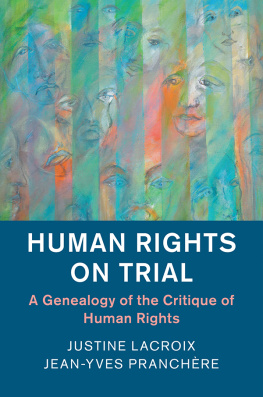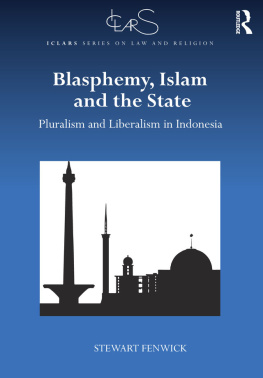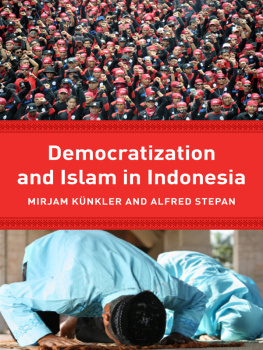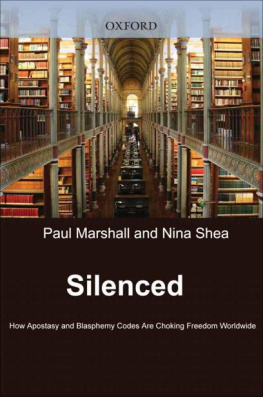This book deserves to be regarded as the definitive study of the Ahok trial, the blasphemy law, and the contentious politics of religious freedom and cultural citizenship in Indonesia. One hopes that the study will be read by legal scholars in Indonesia, since its findings are deeply relevant for Indonesian legal reform.
Professor Robert W. Hefner of Boston University
Islam, Blasphemy, and Human Rights in Indonesia
Using the high-profile 2017 blasphemy trial of the former governor of Jakarta, Basuki Ahok Tjahaja Purnama, as its sole case study, this book assesses whether Indonesias liberal democratic human rights legal regime can withstand the rise of growing Islamist majoritarian sentiment.
Specifically, this book analyses whether a 2010 decision of Indonesias Constitutional Court has rendered the liberal democratic human rights guarantees contained in Indonesias 1945 Constitution ineffective. Key legal documents, including the indictment issued by the North Jakarta Attorney-General and General Prosecutor, the defences Notice of Defence, and the North Jakarta State Courts convicting judgment, are examined. The book shows how Islamist majoritarians in Indonesia have hijacked human rights discourse by attributing new, inaccurate meanings to key liberal democratic concepts. This has provided them with a human rights law-based justification for the prioritisation of the religious sensibilities and religious orthodoxy of Indonesias Muslim majority over the fundamental rights of the countrys religious minorities. While Ahoks conviction evidences this, the book cautions that matters pertaining to public religion will remain a site of contestation in contemporary Indonesia for the foreseeable future.
A groundbreaking study of the Ahok trial, the blasphemy law, and the contentious politics of religious freedom and cultural citizenship in Indonesia, this book will be of interest to academics working in the fields of religion, Islamic studies, religious studies, law and society, law and development, law reform, constitutionalism, politics, history and social change, and Southeast Asian studies.
Daniel Peterson is a qualified lawyer and an Associate of the Centre for Indonesian Law, Islam and Society (CILIS) at the University of Melbourne, Australia.
Routledge Contemporary Southeast Asia Series
The aim of this series is to publish original, high-quality work by both new and established scholars on all aspects of Southeast Asia.
Power Interconnection in Southeast Asia
Anthony David Owen, Anton Finenko and Jacqueline Tao
Contemporary Inter-regional Dialogue and Cooperation between the EU and ASEAN on Non-traditional Security Challenges
Naila Maier-Knapp
Securitising Singapore
State Power and Global Threats Management
Syed Mohammed Adha Aljunied
The European Union and Myanmar
Interactions via ASEAN
Ludovica Marchi Balossi Restelli
The State and Religious Violence in Indonesia
Minority Faiths and Vigilantism
Aan Suryana
Science and Development in Thai and South Asian Buddhism
David L. Gosling
The Arab Uprisings and Malaysias Islamist Movements
Influence, Impact and Lessons
Irwan Saidin
Islam, Blasphemy, and Human Rights in Indonesia
The Trial of Ahok
Daniel Peterson
For more information about this series, please visit: www.routledge.com/Routledge-Contemporary-Southeast-Asia-Series/book-series/RCSEA
First published 2020
by Routledge
2 Park Square, Milton Park, Abingdon, Oxon OX14 4RN
and by Routledge
52 Vanderbilt Avenue, New York, NY 10017
Routledge is an imprint of the Taylor & Francis Group, an informa business
2020 Daniel Peterson
The right of Daniel Peterson to be identified as author of this work has been asserted by him in accordance with sections 77 and 78 of the Copyright, Designs and Patents Act 1988.
All rights reserved. No part of this book may be reprinted or reproduced or utilised in any form or by any electronic, mechanical, or other means, now known or hereafter invented, including photocopying and recording, or in any information storage or retrieval system, without permission in writing from the publishers.
Trademark notice: Product or corporate names may be trademarks or registered trademarks, and are used only for identification and explanation without intent to infringe.
British Library Cataloguing-in-Publication Data
A catalogue record for this book is available from the British Library
Library of Congress Cataloging-in-Publication Data
Names: Peterson, Daniel (Daniel P.), author.
Title: Islam, blasphemy, and human rights in Indonesia : the trial of Ahok /
Daniel Peterson.
Description: New York, NY : Routledge, 2020. | Series: Routledge
contemporary Southeast Asian studies | Includes bibliographical
references and index.
Identifiers: LCCN 2019043322 | ISBN 9780367435332 (hardback) |
ISBN 9781003007814 (ebook)
Subjects: LCSH: Purnama, Basuki TjahajaTrials, litigation, etc. |
BlasphemyIndonesia. | Trials (Blasphemy)Indonesia. | Blasphemy
(Islam) | Islam and politicsIndonesia. | Human rightsIndonesia. |
Human rightsReligious aspectsIslam.
Classification: LCC KNW4172 .P48 2020 | DDC 345.598/0288dc23
LC record available at https://lccn.loc.gov/2019043322
ISBN: 978-0-367-43533-2 (hbk)
ISBN: 978-1-003-00781-4 (ebk)
Typeset in Times New Roman
by Apex CoVantage, LLC
I dedicate this book to anyone who has ever been coerced into silence.
All translations from Indonesian to English contained in this book are my own. Any perceived inaccuracies vis--vis those translations are, therefore, my responsibility too. I have endeavoured to strike a balance between providing accurate translations from a linguistic perspective and ensuring that the expression I use is easily accessible to English readers. Achieving such a balance was not always easy, and I am the first to acknowledge this.
Throughout this book, I also make references to authors and my interview respondents. While the custom in English is typically to refer to the relevant person by their surname, the Indonesian custom is typically to refer to the person by their first name or another name by which they are commonly or affectionately known. Ahok is, of course, an obvious example. Reconciling this difference presents its own challenges, but throughout this book I have sought to make it clear to whom I am referring.
There are many people without whose guidance, expertise, and support I would not have been be able to dedicate the past three-and-a-half years to completing this book. First, I wish to acknowledge my supervisory team of Professor Bryan Turner, Professor Tim Lindsey, and Dr Joshua Roose.
I extend my thanks to Professor Turner for always making himself available as and when necessary, notwithstanding ongoing geographic limitations. In particular, his invitation to present my research at the City University of New York in November 2016 provided me with the opportunity to deliver my first international academic presentation, for which I am most grateful. Professor Turners willingness to promptly read draft chapters and provide feedback was also appreciated throughout my candidacy.

